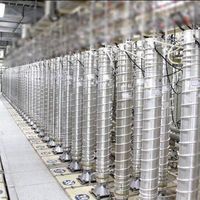Iranian officials and media weigh response to Israel’s attack
Days after Israel’s unprecedented air strikes on multiple military targets in Iran, media outlets in Tehran, think tanks, and some Iranian officials are now assessing the attack’s impact and implications.
This marks a shift from earlier efforts to downplay the significance of Israel’s operation and may reflect Supreme Leader Ali Khamenei’s directive to "neither downplay nor exaggerate the impact of the attack."
Meanwhile, Khamenei stated that it was up to other officials to determine how to respond to Israel. Several observers, including Iran International political analyst Morad Veisi, interpreted this as a sign that Khamenei was once again attempting to sidestep responsibility for a potential conflict with Israel.
In a Tuesday report, the pro-reform website Rouydad24 website in Tehran stated that Saturday’s attack has effectively ended the shadow war between Iran and Israel, raising the question of whether Iran is now prepared for open conflict.
The website quoted Mohammad Khajoui the director of the Lebanese Studies Group at the Middle East Strategic Studies affiliated with the Iranian Foreign Ministry as saying that it is still too early to answer that question.
The website noted that while some argue the attack inflicted significant losses on Iran, others see it as a mere show by Israel. Regardless, Rouydad24 asserted that both Iran and Israel now face an unprecedented situation, with the outcome still uncertain. It suggested that the direction forward may ultimately be influenced by the results of the U.S. election and any potential cease-fire in Gaza and Lebanon.
Khajoui argued that both sides will try to magnify the importance of their own initiatives and to downplay the actions of the other side. This, he said, makes an accurate assessment of the situation difficult.
The Middle East expert explained that since the 1979 Islamic Revolution, Iranian politicians have been divided on how to approach Israel. One faction, driven by ideological beliefs, advocates for Israel’s elimination, while another believes that, as a Western-backed state, Israel could be controlled rather than destroyed. Ultimately, Iran’s political system settled on a strategy of empowering anti-Israel groups in the region rather than directly engaging in attacks against Israel.
Iran openly supported anti-Israeli groups, overlooking the fragile balance that risked escalating into full-scale war. Following Hamas’s October 7, 2023, incursion, Jerusalem sought to turn its setback into an advantage by weakening both Hamas and Hezbollah. However, as tensions escalated, Iran inched closer to direct involvement, leading to the current situation, Khajoui explained.
He added that Iran is unable to respond swiftly to Israel’s attack, placing Tehran in a difficult position as it was unprepared for the current situation. Meanwhile, all options available to Iran come at a high cost. Iran also recognizes that if it chooses inaction or steps back, Israel is likely to press forward. For now, Iran’s only viable approach is to await the outcome of the US election and a potential cease-fire in Gaza and Lebanon.
Meanwhile, Iranian lawmaker Fada Hossein Maleki informed reporters that Khamenei has entrusted the Iranian armed forces with decision-making on how to respond to Israel. However, as analyst Morad Veisi noted, “Iran’s Supreme Leader, Ali Khamenei, frequently deflects responsibility on challenging decisions, issuing ambiguous statements that enable him to sidestep blame if things go wrong.”
Based on the Iranian Constitutional Law, the Supreme Leader is the sole authority to decide on matters of war and peace, and he knows better than anyone else that he is the commander-in-chief of the armed forces. So, in fact, he is handing over decision-making to himself, but tries to evade responsibility and blame others if his decisions backfire.
Maleki, a member of the Iranian parliament's national security and foreign relations committee, stated that Iran’s response to Israel would be determined with “prudence.” This remark suggests that Tehran may not be able to reach a decision as swiftly as some in the press might anticipate.







